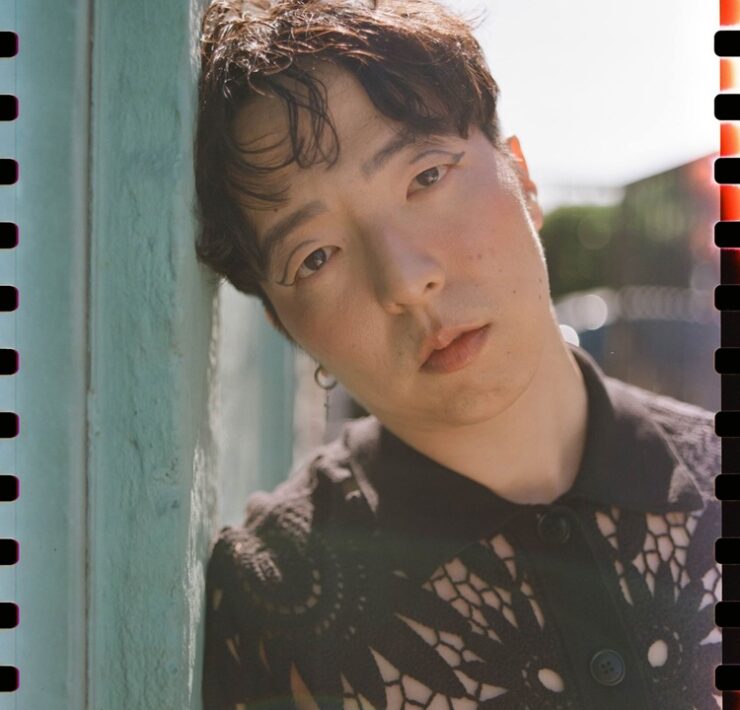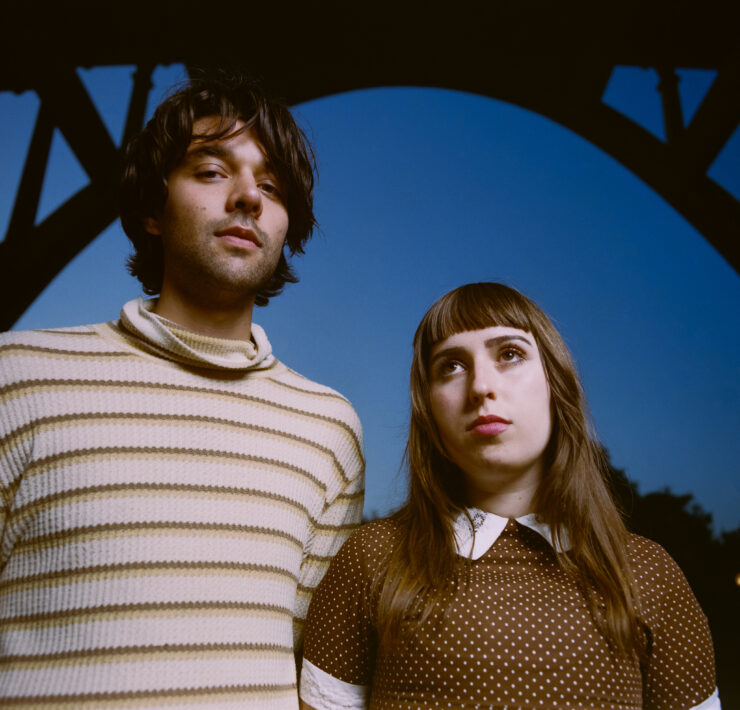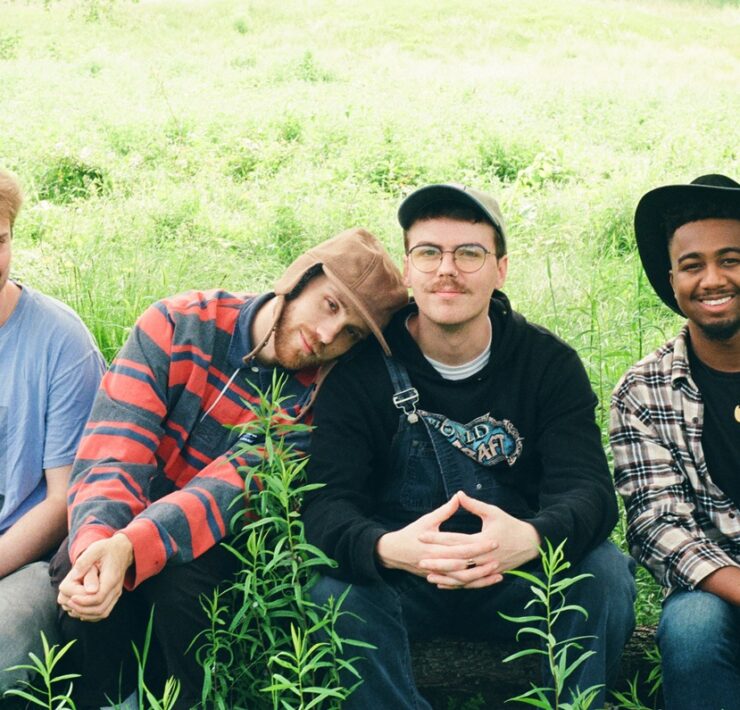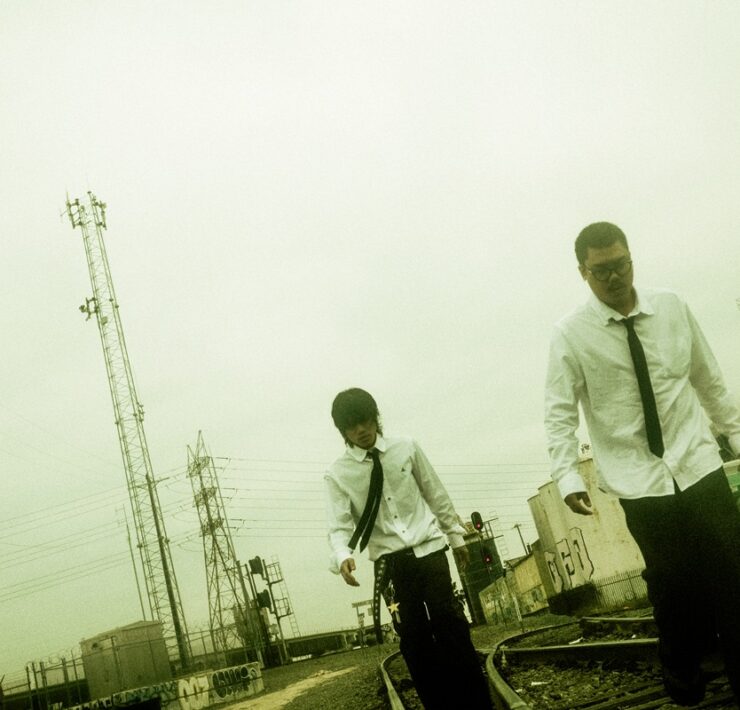A Conversation With Freddie Lewis
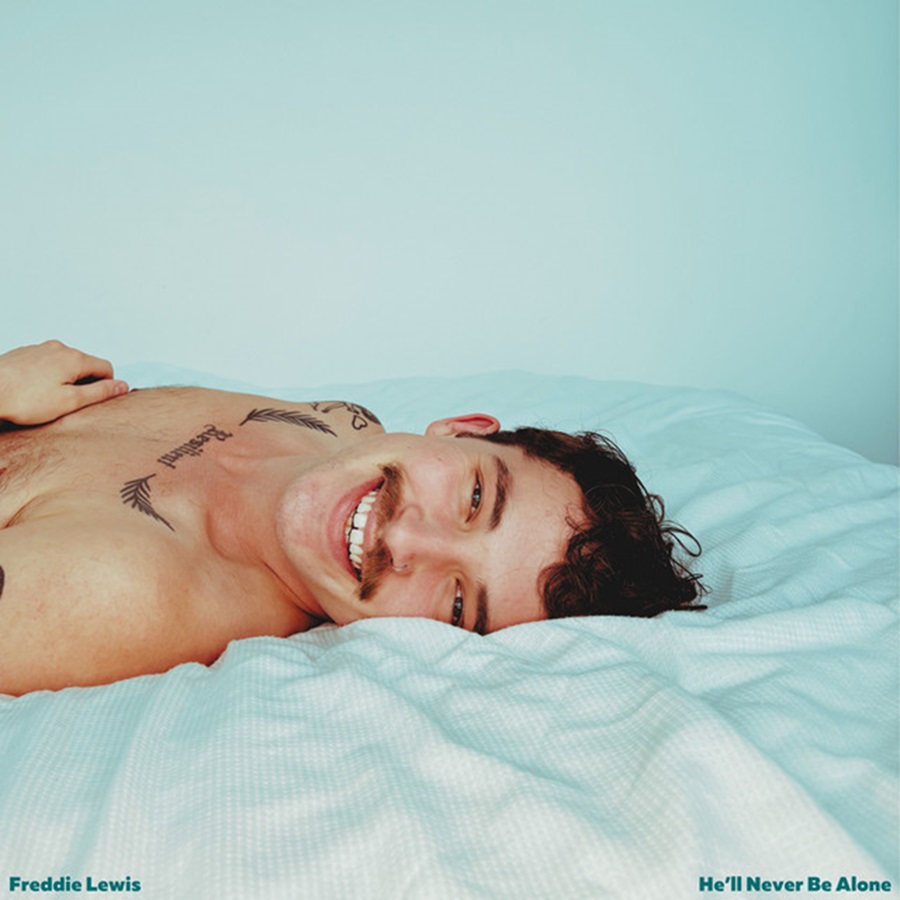
“I feel like my creative process is like a million creative processes happening at the same time, like I write a lot of lyric notes wherever I go in little notebooks, on my phone, on the back of napkins, very much writing words is something I’m doing constantly,” comments Freddie Lewis. If you have not heard of Freddie Lewis yet, you should definitely start listening to his music. He has been making a name for himself in the U.K.’s queer music scene with his passionately heartfelt and beautifully authentic storytelling, powerful voice, catchy hooks, a captivating combination of pop and jazz with experimental sensibilities and hypnotic melodies.
Recently, I chatted with Lewis about his new single “He’ll Never Be Alone,” how he has evolved as a musician, his journey as a trans man, what community means to him, the importance of telling and sharing stories, and future news.
The Creative Process of ‘He’ll Never Be Alone’
“He’ll Never Be Alone” originated from a relationship change that had a breakup vibe. “We were friends, to relationship romantically, back to friends,” says Lewis. “It was what I’m sure loads of people have had and will continue to have in their early 20s in a breakup where you look around your life and go, ‘I think maybe I hadn’t worked on building my own personal community and my own friendships.’ I was afraid of doing those things. I was quite shy about investing a lot in those things. Coming out of the breakup, that became quite clear. Suddenly, there was all this space in my life, and I was very much on my own.” Eventually, Lewis would spend time nurturing friendships, reaching out to people, connecting more with family members, investing more time with himself, and learning how to love the people in his life the best way he could.
Continuing, Lewis remarks, “When I wrote this song, it was like looking back to me a day after the breakup or whenever it was when I woke up in my flat and was like, ‘Oh. It’s just me. Alright, we got to sort this out because this isn’t sustainable.’ I was saying back to him, like, ‘Once you’ve done all those things, you will never be alone because you will always have that relationship with yourself to fall back on, you’ll always have community, and those people will come and go as life does. But essentially, because you’ve got you, you know who you are, what you want, how to ask for it, what you need, and how to give love to people that feels great for both people, you’re gonna be fine. ‘He’ll Never Be Alone’—He is me.”
Evolving as a Musician and Using Spoken Word in Music
Lewis is constantly trying to evolve as a musician. “I think that’s the job of an artist, (to) keep seeking what you don’t know yet and figuring it out,” he explains. Two things he thinks have really developed are his voice and his songwriting. “My voice I’ve really worked on the last couple of years. It’s settled a lot more into this new register that I have … I’ve done a creative writing masters, and my written word is better. Hopefully, that influences my lyrics in a positive way.”
Something interesting about some of Lewis’ music is his usage of spoken word, such as in “Growing Pains” and “Afternoons.” “Growing Pains” was the first song Lewis ever released. He incorporated spoken word out of necessity. “I initially started learning spoken word; to be honest, it was a very practical thing, and it was because my voice was breaking because of testosterone,” he states. “I couldn’t sing particularly well or confidently. Some songs I just wasn’t able to write a melody that worked for my voice. So, I figured out another way to tell the story because I think my work is word first—That was always my love from the beginning. So, I was like, ‘How do I figure out a way to do words without melody?’ And I still think there is something melodic about spoken word. It’s not without melody.”
Alternatively, Lewis used spoken word for “Afternoons,” one of his more recent songs, as a stylistic choice. “I can sing more confidently now,” he says. “I’m not the best singer in the world, but I definitely have mastered my voice in a new kind of way and am still increasingly working on it. I think the reason I chose it for that is because I love The Streets so much. They’re an amazing band—one of the things they do is, they use spoken word to forgive themselves the responsibility of rhyming in the same way or play with rhyme in a much more fluid way then you can sometimes achieve melodically.”
Lewis wanted to achieve something similar with “Afternoons.” “Because it was this song about kind of resting in the afternoon, it starts languidly and lazy in both its instrumentation and in my vocals,” he reflects. “I’m almost rambling, but it’s not rambling. It’s very deliberately written. It wasn’t this stream-of-consciousness writing.” Eventually, the song changes into a more traditional spoken word format. “There’s like clear rhyme patterns and that builds up as the pace increases, but I think it came from this place of wanting it to be relaxed.”
Commissioned Poetry
Along with his music career, Lewis does commissioned poetry. He loves doing them. One reason he started doing them was to make extra money. “(I’m) trying to get more honest about money when I talk about my art because it’s a really good way for me to financially support myself,” he says. People can pay Lewis 50 pounds or more for him to do a poetry piece. “Someone sent me 200 pounds for a commissioned piece the other day, and I was like, ‘Oh my God. That’s like my food for the month. This is amazing.’”
It also allows Lewis to get to know people who like his music better. “People who I don’t have a two-way relationship with yet, I will have a two-way relationship with because we’re sending emails back and forth to each other,” he says. “I had an amazing one at the end of last year where someone had come to my show on tour, and they had come with a date, but they were quite early on in the dating stage. They had just started to kind of float the idea they were falling in love, but they had not done a big ‘I love you’ yet.”
“They commissioned it for Christmas. So, their relationship would have intensified in that time. I wrote a poem that half was their perspective watching me on tour, and half was my perspective from the stage. Then, if you read it together, it was like a conversation that didn’t happen in real-time, but I think the last line was something like, ‘My show is the second-most important thing happening in the room that night because you were falling in love.’ It was so lovely to be that involved in someone’s experience at my show because you never think, ‘Oh. Someone’s falling in love right now.’”
Developing and Building An Identity
Lewis briefly shares his experience coming out as a trans man. “It’s not like I discovered an identity that was buried within me,” he exclaims. “It’s more that I just decided to listen to what I wanted from my body and from my experience of being a person in the world … I resonated with masculinity, and I have one life; why should I restrict my access to that? I don’t believe in identity as this big discovery within. Identity is something we build, not discover, in my opinion. And I built this.”
“Everyone is told they are doing gender wrong,” affirms Lewis. “What being trans is to me is deciding to do something different about it, to step outside and go, ‘I’m not gonna do it that way,’ or I want to explore what it would be to have a different set of bodily characteristics which is like a right that cisgender people have readily… We’re making gendered decisions all the time. It’s just that trans people are seen as huge and decisive because there’s, like, this big red line between man and woman that ‘thou shall not cross’ when actually people on either side of that line are flipping about, like, all the time. One of my cis friends bought his first crop top, and that means he’s making a gendered decision. But it’s not seen as dramatic because he doesn’t want to be called a woman, and that’s the line where everyone’s like, ‘No. You can’t do that.’”
Lewis thinks his identity has developed a lot since he first came out. “I didn’t have any of the language I have now to describe how I was feeling,” he comments. “I only saw in my life gender conforming people, people who conform to the gender they were assigned at birth. I didn’t have an example of how I could build something differently. I never met anyone who looked like how I wanted to look or spoke how I wanted to speak. My first go at building my identity, I was much more masculine than I am now in my behavior, the way I dress, and how I spoke. I was like, ‘OK. I’ll try and go full-throttle on this thing that I don’t really understand or possibly don’t even want in the same way, but I don’t know another way of doing it.’”
Gradually, the more Lewis grew up, and the more he met a variety of people, including many queer and trans people, he learned, as he puts it: “There are a million ways to be, and as long as you’re not taking something that isn’t yours, you can kind of just be what feels right to you.”
Queer and Trans Communities
Lewis finds there are two spheres of queer and trans communities within his life. The first one is the community he has from being a touring musician. “That’s who supports me the most, tends to resonate with my music the most, and sends it to their friends the most,” he exclaims. “They’re important to me in a hugely foundational way because they ‘fuel the fire.’ I couldn’t do the job I do and have a career in the arts the same way I do without my community.”
The other sphere is within Lewis’ immediate life. “I surround myself with queer and trans people and artists who are trans and queer as well, and those people are important because it’s important to not be in a void as an artist and have people you can send things to,” he comments. This community constantly helps one another out, too, as he adds, “If someone is having top surgery, we’ll make a group chat and figure out when we can go shopping with them.”
“We all live our lives in a queer way. So, even my friends who are in more heterosexual passing relationships prioritize their friends way more than some of my straight friends who maybe don’t have a structure of their relationship that allows that. I have really romantic friendships where we do loads for each other. Like we’ll go to the ends for each other. They’ll always say if they can’t do something, obviously. But I’m lucky my life is filled with people who structure their life around community.”
The Importance of Telling and Sharing Stories
“It’s always been important to have a wide range of stories to be available to people in loads of means” says Lewis. “I don’t even just mean that about trans communities. I mean that about people who have immigrated to the country, about working-class stories, about people who have different religions, different cultures, and forgive this for being an incredibly fast sentence because there is no way I can pinpoint all the people I want to talk about, but having access to lots of people’s perspectives is what, in my opinion, makes a fair and functioning ability to access what is going on and form opinions crucially—or to be respectful to people.”
When there is a lack of perspectives from underrepresented groups, misinformation and hate can be easily spread. “In the U.K., there’s a particular vilification of trans people, but there’s also a vilification of anyone who’s not white and anyone that’s deemed out of the ordinary for a myriad of reasons—It’s constantly seeking to find someone whose fault it is,” exclaims Lewis. “When we don’t have access to the stories of those people, and those stories are not as readily shared as the multiple monolithic mainstream press perspectives, it means what we have happening now, which is people forming opinions that aren’t based on whole understandings of the situation, spreading fear, hatred, and violence, like actualized violence. In America, obviously, we’re having lots of legislative violence against trans people and really scary stuff that’s also racist and homophobic.”
Upcoming News
Lewis has more music upcoming music. “I’ve got two more songs that I’m gonna put out pretty soon,” he smiles. “Two more singles that are part of a trio with ‘He’ll Never Be Alone.’ I see them as, like, three that go together.” Once those songs get released, Lewis is going to take a bit of a development break. “I’m gonna just retreat back for a little bit and take some time to get artistically developed to the next level. I think to do that privately and not for the eyes of other people. I think I might further study. I might do a PhD. Trying to figure out where I want to do that. I wanna do musicology or music research.”
Follow Freddie Lewis on Instagram to keep up to date.



